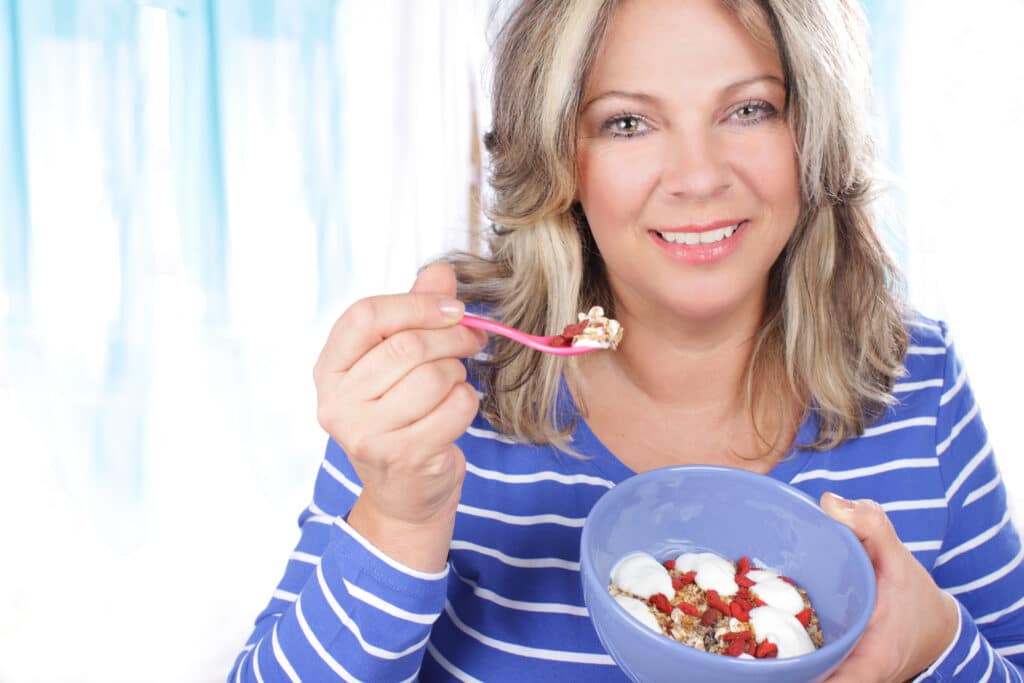Elizabeth Ward, MS, RD
October is World Menopause Month, a time dedicated to raising awareness and fostering conversation about menopause to empower women to lead their healthiest lives. In the United States alone, approximately 6,000 women enter menopause every day, while millions more are navigating perimenopause, also known as the menopause transition. Although every woman experiences menopause in her own unique way, this stage of life often necessitates dietary adjustments to manage the changes that occur in the body.
Menopause is characterized by declining estrogen levels, which can increase the risk of heart disease, osteoporosis, and weight gain as women age. During perimenopause, which typically begins around the age of 45 and lasts between four and ten years, women may start experiencing symptoms such as midsection weight gain, cognitive difficulties (“brain fog”), and digestive issues. In their quest to feel better and control their weight, some women may opt to avoid grain foods, believing they contribute to their problems. However, restricting grain foods may be counterproductive during midlife and beyond.
Grains Provide Key Nutrients Women Need
Women can spend 30 to 40 percent of their lives in the post-menopausal stage. Therefore, maintaining a balanced eating plan that provides adequate calories is essential during perimenopause and beyond to support an active lifestyle and help prevent chronic conditions associated with aging.
Grain foods offer a multitude of health benefits. They provide carbohydrates for energy, fiber for digestion and gut health, protein for cell and tissue maintenance, selenium for protection against cell damage, and magnesium for bone health. Enriched grains in particular are a valuable source of vitamin B12, which supports the heart, brain, and nervous system. Experts recommend that individuals over 50 obtain most of their vitamin B12 through synthetic forms to avoid deficiencies. Enriched grains such as bread, breakfast cereal, and pasta offer an easy and delicious way to incorporate vitamin B12 into the diet.
Grain Foods Come with Other Healthy Ingredients
Imagine a tuna sandwich without bread, a chicken and rice bowl without rice, or marinara sauce and meatballs without pasta. Bland, right? Grain foods not only add flavor and nutrition to meals but also serve as carriers for other healthy ingredients. For example, tuna, chicken, and lean ground beef are excellent sources of protein, which is especially important for meeting the increased protein needs of women over 50 to support muscles and bones. The milk in a bowl of breakfast cereal contributes protein and calcium, addressing the requirement for additional calcium after menopause. Moreover, milk is an excellent source of vitamin D, crucial for calcium absorption.
Grains Are Part of a Balanced Diet
According to the Dietary Guidelines for Americans, adults following a 2,000-calorie eating plan should aim for six servings of grain foods daily, such as bread, cereal, pasta, and rice. Examples of one serving include a slice of whole wheat or white toast, ½ cup of ready-to-eat cereal, or ½ cup of cooked white or whole wheat pasta.
The guidelines also recommend consuming at least three servings of whole grains each day, such as whole wheat bread, oatmeal, and brown rice.
There’s no need to feel guilty about including refined grains like white bread, cereal, pasta, and rice in your diet. Despite their reputation, research actually shows that consuming enriched grains as a group does not contribute to chronic health issues such as type 2 diabetes, cardiovascular disease, stroke, high blood pressure, cancer, or early death.
Grain Foods for a Lifetime of Health
When it comes to menopause and healthy aging, it is the overall eating pattern that matters most, rather than any single food or food group. Avoiding grain foods may actually hinder long-term commitment to a healthy diet, as it may leave you feeling deprived of your favorite foods and lacking essential nutrients for energy. Embrace and enjoy your favorite grain foods, knowing that they not only satisfy your cravings but also contribute to your well-being during menopause and throughout the years to come.

